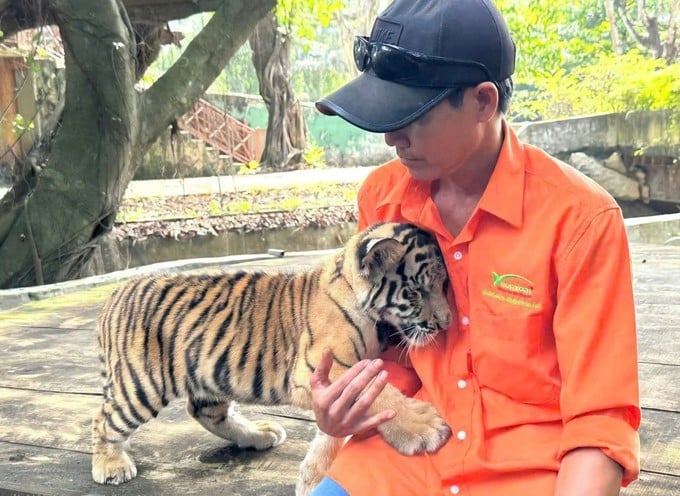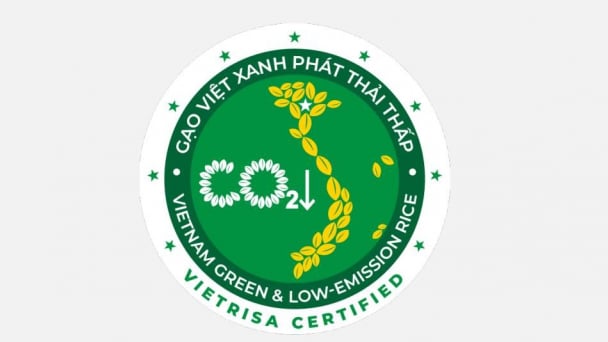May 16, 2025 | 09:53 GMT +7
May 16, 2025 | 09:53 GMT +7
Hotline: 0913.378.918
May 16, 2025 | 09:53 GMT +7
Hotline: 0913.378.918

The Bengal tiger is one of the extremely rare wildlife species. Photo: MS.
On October 8, the General Department of Preventive Medicine sent an official dispatch to the Director of the Departments of Health of Dong Nai and Long An provinces and the Pasteur Institute in Ho Chi Minh City on strengthening the prevention and control of influenza A/H5N1.
Previously, the General Department of Preventive Medicine received a report from the Pasteur Institute in Ho Chi Minh City on recording many wild animals (tigers, leopards, and lions) at zoos and tourist areas in Dong Nai and Long An provinces died and tested positive for influenza A/H5N1.
In order to proactively prevent and control influenza A/H5N1 to minimize the risk of transmission from animals to humans, the General Department of Preventive Health requires units to monitor and investigate the source of infection and deploy measures to prevent, control, and thoroughly handle outbreaks. At the same time, strengthen monitoring to detect new cases, especially cases with signs of severe acute respiratory infections at medical examination and treatment facilities. Be ready to organize collection, quarantine, and treatment according to instructions from the Ministry of Health.
In addition, medical facilities closely coordinate with the agricultural sector and local governments in monitoring and early detecting sick and dead animals and avian influenza outbreaks; promptly share information and coordinate to thoroughly handle the outbreak. Units ensure medicine, supplies, chemicals, and means to promptly support localities in implementing measures to handle outbreaks.
Previously, the Ministry of Agriculture and Rural Development also sent an official dispatch to the Chairman of the People's Committees of Dong Nai and Long An provinces on strengthening management of the risk of avian influenza A/H5N1 virus infection in wild animals. At the same time, My Quynh Zoo (Long An) and Vuon Xoai Ecotourism Area (Dong Nai) are requested not to open for visitors from October 8 to handle the epidemic until the epidemic is over.

As of now, the health of 30 people who had direct and indirect contact with tigers and leopards with influenza at the Vuon Xoai tourist area is still normal. Photo: MS.
The Ministry of Agriculture and Rural Development asks the leaders of Dong Nai and Long An provinces to pay attention and direct relevant departments and branches to urgently deploy solutions to control, prevent, and combat avian influenza in accordance with regulations of the Law on Veterinary Medicine and documents guiding the implementation of the law.
The two localities must also strictly handle cases of keeping wild animals in captivity that do not comply with veterinary regulations, regulations on disease reporting, and animal disease prevention and control. Regarding cases of non-compliance with the provisions of the Law on Veterinary Medicine and the documents guiding the implementation of the law, causing the disease spread, the zoo or tourist area will be closed, and the organizations and individuals involved will be handled the responsibility.
Translated by Thu Huyen

(VAN) Veterinary training should focus on quality, not just quantity. Veterinarians also need more options to pursue specialized training.

(VAN) The veterinary industry needs to be viewed objectively and further invested in to properly demonstrate its role and importance in the new context.

(VAN) The number of veterinarians graduating each year is not enough to meet actual needs, hence a difficult problem for the growing livestock industry.

(VAN) The strategic partnership between Cambodia, the Philippines, Vietnam, and CGIAR ensures that innovative solutions effectively address national priorities for food system development.

(VAN) This was affirmed by the UK Minister of State at the Department for Environment, Food and Rural Affairs during a working session with Deputy Minister Tran Thanh Nam on May 13.

(VAN) On May 13, the Ministry of Agriculture and Environment, in coordination with the Embassy of Vietnam in the United Kingdom, organized a seminar titled 'Connecting trade in Vietnam-UK agricultural, forestry, and fishery products'.

(VAN) The launch of the Vietnam green and low-emission rice brand is a positive signal for both businesses and farmers, marking readiness to reach new heights in the global market.